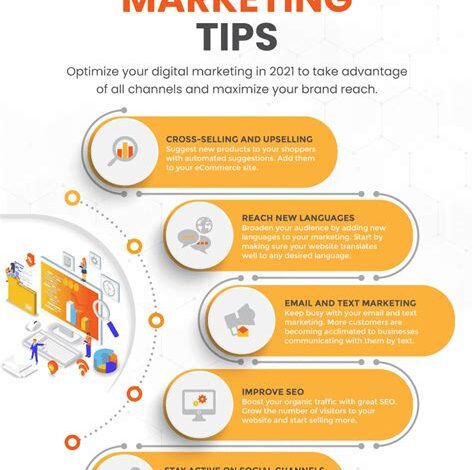Digital Marketing Tips for Small Businesses

Learn how to understand your target audience, create engaging content, and implement social media, SEO, and email marketing strategies to optimize your online presence.In today’s digital age, small businesses need to have a strong online presence in order to compete and thrive. From understanding your target audience to utilizing email marketing, there are numerous digital marketing strategies that can help small businesses reach their potential customers and grow their brand. In this blog post, we will explore some essential tips and strategies for small businesses to effectively navigate the digital marketing landscape. We’ll dive into the importance of understanding your target audience and creating engaging content that resonates with them. We’ll also discuss social media marketing strategies, as well as the importance of optimizing for search engines to improve visibility. Additionally, we’ll explore the power of email marketing and how it can be used to nurture leads and drive conversions. By implementing these digital marketing tips, small businesses can effectively reach and engage with their target audience, ultimately leading to greater success in the online marketplace.
Understanding Your Target Audience
Understanding your target audience is crucial for the success of your digital marketing efforts. It involves gaining insights into the demographics, behavior, and preferences of the people you want to reach. By understanding your target audience, you can create content that resonates with them and effectively addresses their needs and interests.
One way to understand your target audience is by conducting thorough market research. This can involve analyzing data such as age, gender, location, income level, and other relevant factors. Additionally, you can use tools such as Google Analytics and social media insights to gain a deeper understanding of your audience’s online behavior and engagement with your digital channels.
Another important aspect of understanding your target audience is to create buyer personas. These are detailed profiles of your ideal customers, including their goals, challenges, and purchasing behavior. By creating buyer personas, you can tailor your digital marketing efforts to better meet the needs of specific segments of your audience.
Creating Engaging Content
When it comes to digital marketing for small businesses, creating engaging content is essential to capturing the attention of your target audience. Whether it’s through blog posts, videos, social media posts, or other forms of content, the goal is to provide value to your audience and keep them interested in what you have to offer.
One important tip for creating engaging content is to know your audience and understand what they’re looking for. By conducting market research and understanding the needs and desires of your target demographic, you can tailor your content to speak directly to them and address their pain points.
Another key aspect of creating engaging content is to tell a story. Instead of simply presenting information, try to weave a narrative that connects with your audience on a personal level. Stories have a way of capturing attention and sticking in the minds of your audience, making your content more memorable and impactful.
Social Media Marketing Strategies
When it comes to digital marketing for small businesses, social media can be a powerful tool for reaching potential customers and building brand awareness. One of the most important social media marketing strategies is to identify the platforms that are most relevant to your target audience. This might be Facebook, Instagram, Twitter, or LinkedIn, depending on the demographics and interests of your ideal customers.
Once you have identified the most relevant social media platforms, it’s important to create engaging content that will capture the attention of your audience. This could include visually appealing images, informative blog posts, entertaining videos, or interactive polls and quizzes. The key is to provide value to your audience and to create content that encourages them to interact with your brand.
Another important aspect of social media marketing is to be consistent with your posting schedule and to actively engage with your followers. This means responding to comments and messages, sharing user-generated content, and participating in relevant conversations within your industry. Building a strong community on social media can help to increase brand loyalty and drive more traffic to your website.
Optimizing for Search Engines
When it comes to digital marketing for small businesses, one of the most important strategies is optimizing for search engines. This involves making sure that your website is easily discoverable by potential customers when they search for related keywords on search engines like Google. This can be achieved through various tactics such as keyword research, creating high-quality content, and ensuring that your website is well-structured and user-friendly.
Keyword research is the foundation of search engine optimization (SEO) and it involves identifying the words and phrases that potential customers are using to search for products or services in your industry. By incorporating these keywords into your website content, you can improve your chances of ranking higher in search engine results and attracting more organic traffic.
Creating high-quality content that is relevant and valuable to your target audience is another crucial aspect of SEO. This can include blog posts, articles, videos, and other forms of content that address the needs and interests of your potential customers. By regularly publishing such content and optimizing it with relevant keywords, you can improve your website’s visibility and credibility in the eyes of search engines.
Utilizing Email Marketing
When it comes to email marketing, small businesses have a unique advantage. Unlike larger corporations, small businesses can connect with their customers on a more personal level. Utilizing email marketing effectively can help small businesses build and maintain strong customer relationships.
One of the key strategies for small businesses to utilize email marketing is to focus on providing valuable content to their subscribers. By sending out regular newsletters that offer useful tips, industry insights, or special promotions, small businesses can keep their audience engaged and interested in what they have to offer.
Another important aspect of utilizing email marketing for small businesses is to segment their email lists. By categorizing their subscribers based on their interests, purchase history, or engagement level, small businesses can tailor their email content to be more relevant and targeted. This can lead to higher open and click-through rates, as well as better overall results from their email marketing efforts.





